- Home
- K. M. Ashman
Templar Steel
Templar Steel Read online
THE BROTHERHOOD
Book One
Templar Steel
BY
K. M. ASHMAN
Published by
SILVERBACK BOOKS LTD
Copyright K M Ashman 2018
All rights are reserved. No part of this publication may be reproduced, stored, or transmitted in any form or by any means, without prior written permission of the copyright owner.
----
All characters depicted within this publication are fictitious and any resemblance to any real persons living or dead is entirely coincidental.
----
KMAshman.com
Also by K. M. Ashman
The India Sommers Mysteries
The Dead Virgins
The Treasures of Suleiman
The Mummies of the Reich
The Tomb Builders
The Roman Chronicles
The Fall of Britannia
The Rise of Caratacus
The Wrath of Boudicca
The Medieval Sagas
Blood of the Cross
In Shadows of Kings
Sword of Liberty
Ring of Steel
The Blood of Kings
A Land Divided
A Wounded Realm
Rebellion’s Forge
The Warrior Princess
The Blade Bearer
Individual Novels
Savage Eden
The Last Citadel
Vampire
The Brotherhood
Templar Steel
Templar Stone (Coming Soon)
Audio Books
A Land Divided
A Wounded Realm
Rebellion’s Forge
The Warrior Princess
Blood of the Cross
The Last Citadel
KMAshman.com
Contents
Map
Character List
Prologue
Chapter 1
Chapter 2
Chapter 3
Chapter 4
Chapter 5
Chapter 6
Chapter 7
Chapter 8
Chapter 9
Chapter 10
Chapter 11
Chapter 12
Chapter 13
Chapter 14
Chapter 15
Chapter 16
Chapter 17
Chapter 18
Chapter 19
Chapter 20
Chapter 21
Chapter 22
Chapter 23
Chapter 24
Chapter 25
Chapter 26
Chapter 27
Chapter 28
Chapter 29
Chapter 30
Chapter 31
Chapter 32
Chapter 33
Chapter 34
Chapter 35
Chapter 36
Chapter 37
Chapter 38
Chapter 39
Author’s Notes
Summary
MAP OF THE HOLY LAND – CIRCA AD 1177
Character List
Aristocracy
Baldwin IV - King of Jerusalem
Almaric - Baldwin’s father
Agnes of Courtenay – Almaric’s first wife
Maria Comnena – Almaric’s second wife
Raynald of Châtillon – Lord of Oultrejordain
Clergy
William of Tyre – Catholic prelate (and Baldwin’s teacher)
The Bishop of Bethlehem – Protector of the Cross of Jerusalem (The True Cross)
Christian Forces
Eudes de St. Amand – 8th Grand Master of the Knights Templar
Brother Tristan - Marshal of the Templar Order
Brother Valmont of Lyon - Seneschal of the Templar Order
Jakelin de Mailly - French Templar Knight
Richard of Kent – English Templar Knight
Benedict of York – English Templar Knight
Gerald of Jerusalem – English Knight
Robert of Essex - English Knight
Thomas Cronin - Sergeant at Arms
Simon Callow - Sergeant at Arms
James Hunter - Scout
Bedouin Squire – Hassan Malouf
Muslim forces
Salah ad-Din - Saladin – Sultan of Egypt and Syria
Shirkuh ad-Din - Saladin’s General
Farrukh-Shah – Saladin’s nephew
Taqi ad-Din - Ayyubid commander at Montgisard
Prologue
In November 1095, Pope Urban the Second addressed a large gathering of French clergy and noblemen at the Council of Clermont in Auvergne, France.
In his speech, he referred to the terrible unrest across the country and reminded the nobles of their holy duty to rule their provinces with an even hand. In particular, they were to ensure the protection of the clergy at all levels and restore justice and public order to the people.
Those present acknowledged and supported the Pope’s direction and it wasn’t long before he cleverly turned their attention to the main issue on his mind, suggesting that once righteousness had been restored, it could be used in God’s service to support the Christians in the east, who were suffering terrible atrocities at the hands of the Turks.
He went on to report that untold numbers of Christians had either been killed or captured by the Saracens in the east, with many being tortured to death or sold into slavery. Churches were being desecrated and the kingdom of God was being devastated. The audience was horrified and listened intently as he went on to recount terrible stories of the rape and murder of Christian women amongst other unspeakable atrocities.
Pope Urban went on to entreat everyone present to spread the message widely, persuading people of all stations to rise in anger at the treatment of the Christians and engage in a holy war to defend God’s people. He went on to preach that brothers who had fought brothers could now unite under one banner, and those who had led a life of crime could become righteous once more in the service of God’s army. Furthermore, he promised that all who died in such a war would receive full absolution from whatever sins they had committed throughout their lifetime, guaranteeing them entry through the gates of heaven.
The effect of Pope Urban’s speech was immediate, and word spread far and wide. For the next few months, his clergy spread the message throughout Europe and soon, tens of thousands of people ranging from the highest echelons of the aristocracy to the humblest of peasants pledged to aid the Christians of the Holy Land.
Eventually, four separate crusader armies were recruited, assembling sometime just after November 1096 outside the walls of Constantinople and after making their holy vows, crossed the Bosporus in early 1097.
After enduring terrible hardship and fighting in many brutal battles, the soldiers of the first crusade finally reached the gates of Jerusalem in July 1099. However, due to the terrible state of their forces and vastly reduced numbers, the rumours that a relieving Turk army was already on its way forced their commanders to act quickly and they decided to take the city rather than lay siege to seek its surrender. Consequently, they attacked immediately, and on the 15th July 1099, Jerusalem fell to the crusaders.
Led by Raymond of Toulouse and Godfrey of Bouillon, the victors rampaged through the city slaughtering anyone they could find, even killing those who surrendered or who hid away in mosques and synagogues. Thousands died, and the streets ran with blood but by the time the Crusaders had finished, Jerusalem was entirely in the hands of the Christian army.
The victory was overwhelming yet despite being offered the kingship, Raymond of Toulouse refused. At first, Godfrey of Bouillon also refused the honour stating that Christ himself only wore a crown of thorns but finally he accepted the governance of Jerusale
m, though only accepting the title of Advocate of the Holy Sepulchre.
The following year Godfrey struggled to expand his influence so after immense political pressure from the Archbishop of Pisa amongst others, stood aside to allow his own brother Baldwin of Bouillon to be crowned king on Christmas day AD 1100. The first crusade had been successful and at last, vast parts of the Holy Land was in Christian hands.
For the next decade or so, the number of pilgrimages from the west hugely increased. However, the journey was fraught with danger and many travellers were attacked and killed en-route in retribution for what the Muslims saw as nothing more than a sacrilegious invasion of their homeland.
Finally, in 1119, an Italian nobleman, along with eight other knights formed an alliance with the stated ambition of protecting pilgrims on their journey to the holy places of Jerusalem and approached the new king, (also called Baldwin) to seek recognition and a place to base themselves. Baldwin II subsequently allowed the knights to set up their headquarters in the Aqsa Mosque on the Temple Mount within the city walls.
The new order needed a name and as the Mosque was also known as the ‘Templum Solomonis,’ they became known as ‘The Poor Fellow-Soldiers of Christ and of the Temple of Solomon.’
This title soon become shortened and within a few years, the order became famous across the Christian world as a body of fearless knights who fought to protect pilgrims in the name of the lord.
The order of the Knights Templar had been born.
----
Chapter One
The Mediterranean Sea
October 12th
AD-1177
Jakelin de Mailly stood on the forecastle of the galley, feeling the familiar desert wind on his face as it blew from the shores of the Holy Land somewhere over the horizon. At his side, stood the ship’s Captain, a surly man more interested in dock-women and gambling than the ideals of Christian men, but he was a master mariner and his reputation sailed before him like a ship in favourable winds.
‘Another few hours,’ said the Captain, ignoring the knight’s higher station, ‘and you will see the towers of Acre rise like serpents from the sea.’
‘And not a minute too soon,’ said Jakelin. ‘Our horses need to feel solid ground beneath their hooves before they wither away.’
‘We have lost neither beast or man on this voyage,’ replied the Captain, ‘I promised safe passage and have delivered on my word.’
‘Just get us to Acre,’ said Jakelin, ‘you will receive your purse upon landfall.’ The Templar Knight walked to the rail and peered forward, seeking the land that he would soon be calling home.
‘We should be there by noon,’ continued the Captain, following the knight, ‘but disembarkation may yet be a few days away as there are so many ships to unload. I heard that Phillip of Flanders landed a huge fleet in Acre only a few weeks ago.’
‘It seems so,’ replied Jakelin, his gaze never leaving the horizon, ‘it is rumoured that he brought an army to join with the Byzantines in the fight against the Ayyubid.’
The Captain stared at the impressive knight with interest. Templars were famous throughout the Christian world, but this was the first time he had ever seen one up close. Like the other knights in his order, Jakelin was heavily bearded yet kept the hair on his head cut close to his scalp. His muscular frame bore witness to the countless hours spent on the training field, and he carried an air of invincibility about him like the heaviest of cloaks. A trait common to all such men familiar with the trials of war.
The captain found the monastic order strange and secretive, as did many men, and the fact that he had been requested to divert his ship to pick up three from Southampton only added to the intrigue. Every Templar knight came with three Destriers and an equipment chest. In addition, each had a company of two sergeants with two more horses, and a hired squire of common stock with his own mount and pack mule. In all, there were only three knights aboard the ship, but the space needed was the equivalent to at least twenty ordinary men at arms.
‘So, have you come to fight the Saracens?’ he ventured.
‘We have come to join our brothers in protecting those pilgrims who seek the holy places,’ replied the knight, ‘and if that means conflict with the Saracens then so be it.’ He turned away, once more gazing toward the east.
‘What awaits you in Acre?’ asked the Captain, determined to engage in conversation with the strange man while he still had the chance.
‘Once we disembark,’ said the knight, ‘our Grand Master will direct us onwards as required.’
‘Ah, the famous Eudes de St Amand,’ said the Captain. ‘I have heard he is a very impressive man.’
‘I think he would be disturbed to be described as such,’ said Jakelin, ‘for reputation raises us above our station.’
‘Nevertheless, he is known across the Outremer as a great warrior and has fought in many battles. Such a man deserves respect.’ He paused and stared at the knight again. The three Templars and their entourage kept their own company and occupied the lower deck at the stern of the ship. They asked for no favour or any extra rations that their station may well expect, preferring instead to share the crew’s humble fayre and were first to volunteer when any aid was needed to fix a problem or stand a watch. Any spare time was spent in prayer or solitary contemplation, such was their humility.
‘These are dangerous times, Sir knight,’ continued the Captain, ‘and I have heard that Saladin is preparing a great army in Egypt. You may have come to protect pilgrims, but I suspect you could be fighting Saracens before the year is out.’
‘You seem to hear a lot of things,’ said Jakelin without taking his gaze from the horizon, ‘why don’t you just concentrate on getting us there.’
‘Forgive my interest, Sir Knight,’ said the Captain, ‘it is just that your order intrigues me. You proclaim poverty yet are better equipped than any other men I have ever carried on my ships. It is said you spend most of your time in prayer yet fight like demons when the need arises and seek nothing in return except absolution from your chaplains at the end of each day. Humility is a great thing but surely all men have a need for something?’
‘To live in the service of the Lord is reward enough,’ said Jakelin, ‘now, if you don’t mind, I wish to be alone with my thoughts and with God.’
With a grunt, the Captain turned away to resume his duties, knowing full well that to press the warrior monk further was pointless.
Jakelin de Mailly placed his hands on the rail and breathed in the salty sea air. All around him was nothing but emptiness, a vast lonely space where the swell of the Mediterranean mimicked the rolling, desolate deserts of the Holy Land, the place he had once called home. Each vista was as beautiful as the other, yet both equally as deadly.
The sound of the rhythmic waves breaking upon the ship’s bows seeped into his consciousness, easing his troubled mind, but even as he allowed himself a rare moment of relaxation, he knew the Captain had been correct. War was coming and if Saladin carried out his threat to invade Jerusalem, the strength of the Templars would be needed now more than ever.
He had no fear of battle for if he was to fall, then it would be in God’s service, but even as the thought crossed his mind, his hand crept to the hilt of the sword hanging from his belt.
The weapon was like an old friend and comfortably heavy, a reminder that even with God on their side, there was one thing more than any other that would keep him and his comrades alive in the dangerous days ahead, Templar steel.
----
Chapter Two
The Port of Acre
October 12th
AD-1177
Hassan Malouf stood on the dock, cradling a tray of figs as he watched the ships unload. The sight never failed to amaze him and though he had been born an Arab, he longed to one day see the far-off lands that these wonderful people came from. Hassan was fourteen years old, the son of a Bedouin trader but had been indoctrinated into the Christian faith by the priests of Acre a
fter being found injured in the desert a few years earlier.
The port was a hive of activity. Six ships lay at anchor at any one time and as each finished unloading, they were replaced by one of the many others waiting their turn outside the harbour walls. Lines of soldiers, each carrying their own equipment made their way carefully down swaying gangplanks and hustled into ranks on the quayside, berated on all sides by belligerent sergeants. Half-naked slaves grafted in the heat of the midday sun, passing countless boxes of supplies down to the waiting carts while others waited to restock the ships with barrels of fresh water and crates of supplies for the journey back.
Most of the ships carried men at arms from across Europe but others had a humbler cargo, pilgrims desperate to reach Jerusalem and though most of the street urchins made these the target of their attention, Hassan was interested in a completely different type of person, the type that filled his nights with dreams of chivalry and adventure. As the last ship of the day approached, Hassan jumped up from the empty crate where he had sat for most of the day and picked up his tray of figs. He brushed away the flies and made his way quickly over to where the dock workers were preparing to accept the mooring ropes.
For the next half hour, he watched as the ship was made safe and the slaves started to unload the cargo from the forward ramps. To the rear, a wider gangway allowed horses, long starved of meaningful exercise to be led nervously down to the quay, followed by two dozen knights adorned with surcoats displaying their individual coats of arms. Each man was bedecked in chainmail and carried a sword almost as tall as himself, but though their presence caught the eye of everyone near, he hoped there would be others, far more impressive.
The last of the knights finally disembarked to take possession of their horses on the dock and when they were all finally assembled, rode away towards the city and the courtly welcome they knew awaited their arrival.

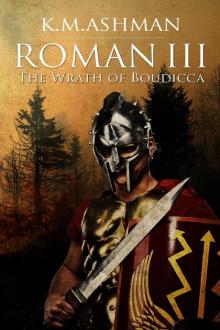 The Wrath of Boudicca
The Wrath of Boudicca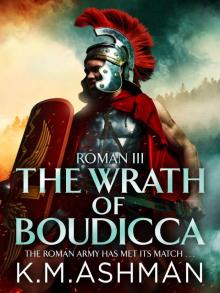 The Rise of Caratacus
The Rise of Caratacus Vampire
Vampire The Dead Virgins (The India Sommers Mysteries Book 1)
The Dead Virgins (The India Sommers Mysteries Book 1)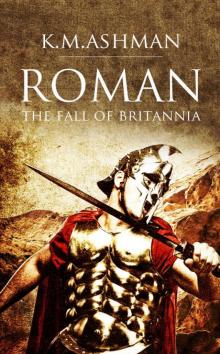 Roman - The Fall of Britannia
Roman - The Fall of Britannia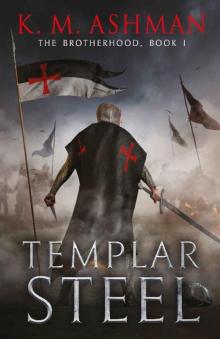 Templar Steel
Templar Steel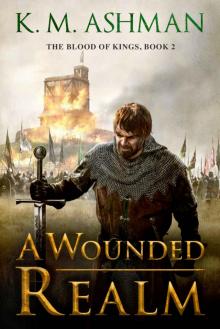 A Wounded Realm
A Wounded Realm The Warrior Princess
The Warrior Princess